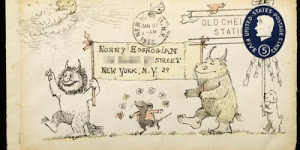Got a party or event? Then you'll probably want people to know about it. This is where invitations come in. In this digital age, e-vites are becoming more common, but if it is an at all formal event, you're likely going to be sending the good old-fashioned paper kind too. There are no hard and fast rules to writing invitations; what the invitation is for will be your guide. But here are some tips to get your invitations off to a good start:

|
| photo source: unknown |
1) Be sure to include the following: What the event is (wedding, funeral, party, dance etc.), where it will be held, when the event is (include the date, the day of the week, and the time the event starts), and who is being invited. If applicable, also include information about who the event is being held for/in honor of, and who is hosting.
2) Sometimes additional information or instructions might also be needed for the guest. Do they need to bring anything (a gift or foodstuff perhaps)? Is there a specific dress code (FYI: White Tie mean men will wear white ties and vests with black tails; black tie affairs have men in tuxes with black ties; semi-formal affairs have men in suits and jackets. For women, the dress code is much looser, but most would still wear formal evening gowns to white and black tie affairs, and shorter dresses would be more common at semi-formal events)?
3) If additional information about getting to the event is needed, these are often on a separate, smaller piece of paper. The information might include: a map; driving or walking directions; or information about alternative transportation.
4) Invitations are written in the third person. It lends a certain formality, and also helps communicate who is hosting the event. An example of this is, "Lisa Satterlee requests the pleasure of your company at a retirement party for her husband, Craig."
5 ) In general, the more formal the event the more formal the wording. The exception is if you are writing to children. Then clearer instructions, less formality, and writing at an appropriate reading levels takes precedence.
6) You say "request the honor of your presence" when the event is being held at a church or other place of worship, and you say "request the pleasure of your company" if the event is being held at any other location.
7) There are several convention about writing the guests' and hosts' names. You should always use and spell out full titles, with the exception of any general titles (such as Doctor/Dr, Missus/Mrs. or Mister/Mr.). You do not need to add the PhDs or other degrees at the end of any titles though. Some of the titles you might write out in full include, but are not limited to, military ranks and governmental posts such as judges or mayors. Also, invitations should include both the hosts' and guests' names in full, with first and last names. The exception is when a person's relation has been established to someone who's last name has been mentioned. For example in the line, "Lisa Satterlee requests the pleasure of your company at a retirement party for her husband Craig," We know that Craig's last name will be the same as Lisa's because his relation to her as a husband has been established. This is also common on wedding invitations where the parents are hosting; the bride and/or groom's last names are sometimes left off, since the relationship to the host(s) is clear. Lastly, if you choose to include middle names of any guests, hosts or honorees, those too need to be fully written out and not just as initials.

|
| Photo source: Thomas Printers |
8) If you require an estimate of how many guests will be coming, remember to include an RSVP. Most often such events will be limited to ones where you must make a reservation, serve food or have exact numbers of chairs. For more formal events, like a wedding, you should include a separate pre-addressed and stamped page and/or envelope for guests to send you the information. If you do not choose to send RSVP stationery remember to include ways for your guests to contact you (i.e. if you prefer a phone call or email indicating their acceptance, don't forget to include your phone number or email address). Always include a return address at the top of your invitation's envelope as well; some people will write letters of acceptance back to you.
For further reading, look at these articles:
The Etiquette of Writing Wedding Invitations by Susan Fox at the For Dummy's website
Basic Invitation Writing Guideline/Tips for Outlines at the Lifetips website
How to Write an Invitation from Best Letter Help




VERY good tips!
Reply Delete*Besos*
http://www.cmichellestyles.com
Instagram: Cmichellestyles
Pinterest: Cmichellestyles
This is so informative!
Reply Delete